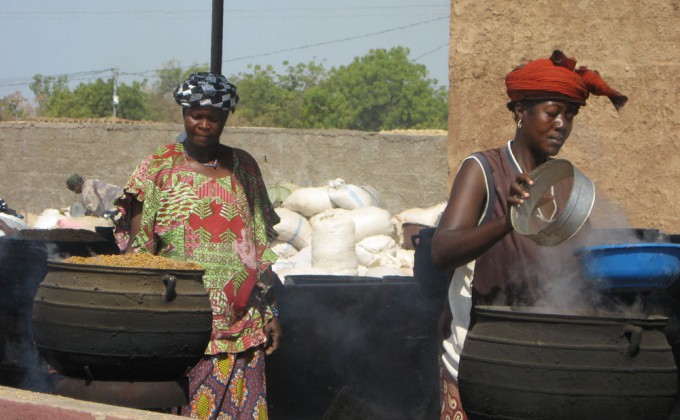
Burkina Faso, Banzon and Bama departments

2009 to 2014

- 1,133 members of parboilers groups,
- 100% women Banzon: 450 rice parboilers; 352 tons of rice/year;
- 113 million FCFA annual turnover Bama: 683 rice parboilers; 563 tons of rice/year;
- 180 million FCFA annual turnover

- Comité Interprofessionnel du Riz, Burkina Faso (CIR-B)
- Groupe de Coopération Internationale de l’Université de Sherbrooke (GCIUS)

DFADT via the Uniterra program
 © Caroline Roger
© Caroline Roger
Parboiling is a process that involves soaking and then precooking the paddy rice. In the Banzon and Bama plains of western Burkina Faso, CECI operations have enabled more than 1,133 parboilers to join forces in professional associations.
CECI’s experience in neighbouring Mali provided the inspiration for the Burkinan project. Having learned from our collaboration with the Fédération des Centres de Prestations de Service Faranfasiso (FCPS) and our work with Malian women parboilers, CECI was able to repeat these successes south of the border.
By joining together and forming associations, Burkinan entrepreneurs have been able to take advantage of numerous training opportunities, and those in Bama and Banzon now each have the benefit of a parboiling facility built by GCIUS, a group of young engineers from the Université de Sherbrooke volunteering with Uniterra. The facilities in Bama and Banzon provide the women with a working environment that is conducive to meeting standards of both hygiene and product quality. As well as improving their working conditions, the project has also given these women the opportunity to earn income, which they can then manage themselves. Ramata Soré, founding member of the Bama union of parboilers, talks about how her financial independence has allowed her to take part in family decision making, explaining, ”If you have nothing to contribute to the family finances, you have nothing to say.”
In addition, Burkinan authorities have recognized the positive contribution of the parboilers project: “The Minister of Agriculture has asked CECI to expand the project’s successes throughout the country,” reports Adama Ouedraogo, CECI director in Burkina Faso.
By adding value to an agricultural product and helping to market it, CECI has enabled women to earn an income and to gain self-confidence. In Burkina Faso as elsewhere, development is closely tied to the economic empowerment of women.
By improving rice parboiling conditions, 450 women in Banzon and 683 women in Bama bring more than 900 tons of parboiled rice the people, thereby helping to achieve food security and improve nutrition.
¹ Unhulled rice, still in its husk; unrefined.